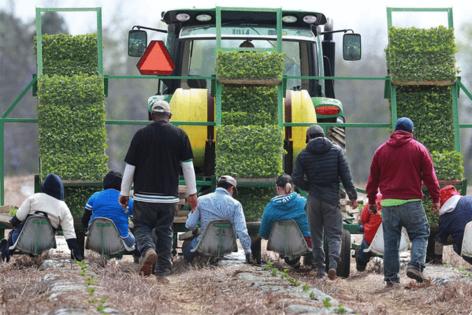Georgia judge blocks new protections for migrant farmworkers
Published in News & Features
ATLANTA — Legal challenges are continuing to mount against a new Biden administration regulation that sought to expand the rights of migrant farmworkers on seasonal visas and give them more leeway to engage in union-related activities.
Late last month, a federal judge in Georgia blocked the regulation from taking effect within the state and across 16 other Republican-led states, after a coalition of Georgia farmers and state attorneys general sued. A Georgia agriculture industry group had warned of “devastating” potential implications for Georgia farmers’ bottom lines.
Earlier this week, farmers and trade groups filed two additional lawsuits over the regulation in North Carolina and Kentucky.
At the center of the rule — and the lawsuits that followed — is the H-2A guestworker program, which lets U.S. farmers bring in migrant farmworkers for a limited time to help with harvests.
As native-born workers continue to gravitate away from arduous field work, Georgia farmers have grown increasingly dependent on H-2A labor, making the state one of the top users of the program nationwide. In 2023, more than 37,500 H-2A workers came to Georgia, up from roughly 5,800 in 2012.
The program’s growth has come with multiplying reports of labor abuses.
Earlier this year, the U.S. Department of Labor, which administers the H-2A program, announced that it found violations in 90% of the agricultural worksites it inspected in the Southeast in 2023.
Advocates say H-2A workers are disproportionately vulnerable to abuse because they live and work in geographically isolated areas. They are also dependent on their employers to retain legal status in the country, putting them on the wrong end of a stark power imbalance.
In 2021, South Georgia made national news when a federal investigation dubbed Operation Blooming Onion uncovered a criminal ring that allegedly subjected H-2A workers to “modern-day slavery,” with migrants being forced to dig for onions with their bare hands under the threat of gun violence. Last year, The Atlanta Journal-Constitution reported on claims that contractors hired by farmers to find H-2A workers were charging illegal recruitment fees, putting workers in debt and making them vulnerable to abuse.
The Biden administration sought to curb some of these violations with the rule, expanding H-2A farmworkers’ ability to organize for better working conditions without worrying about employer retaliation.
The rule, issued by the Department of Labor, also allows farmworkers to leave meetings in which employers try to dissuade them from joining a union. They are also allowed to invite guests in to their employer-provided housing, including representatives from labor organizations, and they can bring in a designated representative to sit in on reviews with employers that may yield disciplinary action.
Based in Brunswick, U.S. District Judge Lisa Wood said that the new H-2A rule is not valid because agricultural workers were excluded by Congress from the National Labor Relations Act, a seminal 1935 law that enshrines private sector workers’ right to form trade unions and otherwise organize for better working conditions.
The parties behind the lawsuit that led to Judge Wood’s preliminary injunction say that the attempt to give H-2A farmworkers new organizing rights amount to government overreach, and that they risk putting growers out of business.
“American food producers are the backbone of our country and they should not be disadvantaged by federal policies from the Department of Labor that aim to rewrite federal law to benefit foreign H-2A visa workers over U.S. farmers. We are pleased the court agreed with us and stopped this program with the preliminary injunction,” said attorney Braden Boucek with the Southeastern Legal Foundation, who represents the plaintiffs.
In addition to its provisions around labor organizing, the new regulation requires seat belts in vehicles used by employers to shuttle workers to farms. It also reinforced that farmers are prohibited from confiscating worker’s passports.
“It is hard to emphasize how shameful it is for Georgia to lead a lawsuit against a federal rule designed specifically to prevent future incidents of the ‘modern-day slavery’ uncovered in Georgia agriculture just a few short years ago,” Antonio De Loera-Brust, communications director for United Farm Workers, said in a statement. “Georgia workers deserve better.
“Make no mistake: the Labor Department’s new H-2A rule would protect the rights of H-2A and U.S. citizen workers alike, and is a direct response to the abuses uncovered in Georgia agriculture by Operation Blooming Onion.”
©2024 The Atlanta Journal-Constitution. Visit at ajc.com. Distributed by Tribune Content Agency, LLC.







Comments